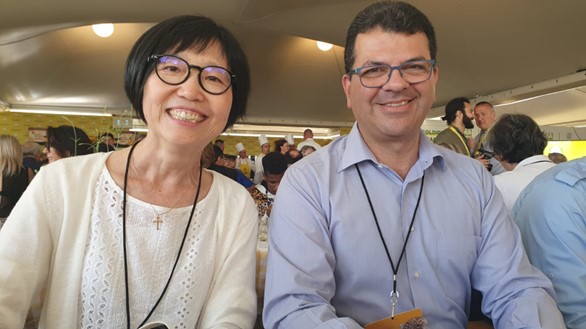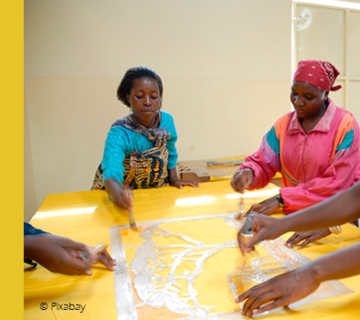The Meeting on Human Fraternity took place in the Vatican on 10 June 2023. The Focolare Movement together with a number of other ecclesial movements and international associations and organisations took part in this international event. It was represented by its president, Margaret Karram and a number of other focolarini including Christian Abrahao Da Silva who spoke about his impressions.
The meeting had a number of aims: these included promoting and developing the process of participation, rediscovering the meaning of fraternity and building it together through dialogue, knowledge, opportunities for encounter and sharing words and actions. The gathering was promoted by the Fratelli Tutti Foundation and St. Peter’s Papal Basilica, under the patronage of Cardinal Mauro Gambetti, Archpriest of St. Peter’s Basilica in the Vatican and Vicar General of the Vatican State. It was inspired by the encyclical Fratelli Tutti and participants included several Nobel Peace Laureates and a number of well known people from the worlds of science, culture and law. They were given the task of creating a “Call to Commitment for Human Fraternity.” The document they produced was read by two Nobel Prize laureates, Nadia Murad and Muhammad Yunus, during the Festival held in St. Peter’s Square in the afternoon and was later signed by the Secretary of State, Cardinal Parolin, on behalf of Pope Francis as well as the group that drafted the document. Christian Abrahao Da Silva, a focolarino who attended the Meeting, tells us what an extraordinary moment it was.
 Christian, what did taking part in this event dedicated to world fraternity mean to you?
Christian, what did taking part in this event dedicated to world fraternity mean to you?
First of all, it was a great honour. Margaret Karram, the Focolare president, another focolarina called Corres Kwak and I represented the entire Movement during this great event. Its goal was to promote fraternity and social friendship among people and among peoples, as an antidote to the many forms of violence and war taking place in the world. The meeting was held in two parts: the morning session took place in the ancient synod hall, with the presence of representatives of various church movements and associations. Instead, in the afternoon, a large Festival was held in St. Peter’s Square and this connected with events taking place in various squares around the world.
How did the Meeting begin?
During the morning, we took part in two working groups where we were asked to answer two questions: “What are we doing concretely to achieve social fraternity and environmental fraternity?” and “Is there still an ‘us’?” These were very good sessions in which everyone was involved. People talked a lot about the “garden” in reference to the Garden of Eden about which Pope Francis had written in Fratelli Tutti. The words used most often were were: compassion, responsibility (political and economic), sharing, integral promotion, recognition of every human person, care and welcome. It was a real ecclesial experience: there was great hope that this can grow and witness to the need to rediscover and strengthen human fraternity.
What impressed you the most?
In addition to the group of Nobel Peace Prize winners and the group of ecclesial movements and associations, there was also a group of 30 young students from various Italian schools who were accompanied by their religious education teachers. They had taken part in a competition to express the theme of the Meeting in a variety of different artistic forms. Their presence was an important sign of the commitment of the new generations to learning about fraternity. Other things that struck me were the experiences that some people shared on Festival stage in the afternoon and the artists who shared their talents so freely and joyfully.
What does the Focolare Movement take home after this event?
Pope Francis relaunches fraternity as a new anthropological paradigm on which to rebuild actions and laws because “fraternity has something positive to offer freedom and equality” (Fratelli Tutti, no. 103). This notion brought to mind a talk by Chiara Lubich entitled, “Freedom, equality…what happened to fraternity?” It was one of those events that encourages us to throw ourselves more and more into the heart of our charism of unity. Moreover, Cardinal Gambetti really touched our hearts when he explained the inspiration behind the Meeting. He said it was both a “process and experience, a first step in rediscovering the meaning of fraternity and building it culturally.” He continued by saying that becausé it is not giveǹ biologically, fraternity needs encounter and dialogue, knowledge and shared words and gestures, common languages and the experience of beauty.
Maria Grazia Berretta


 Italiano
Italiano Español
Español Français
Français Português
Português




Tuve la oportunidad de visitar con mi esposa el Vaticano y nos encontramos con la maravillosa oportunidad de compartir el Día Mundial de la Fraternidad. Recibimos de regalo unas semillas y quisiéramos saber de que especies son…
Agradecería mucho nos den información Felicitaciones!!!!
notizie che partono da Roma da Loppiano per andare in Guatemala fanno capire che la fraternità universale avanza con costanza e fa ben sperare per il futuro; quando sono coinvolti giovani e bambini la speranza si fa più solida.